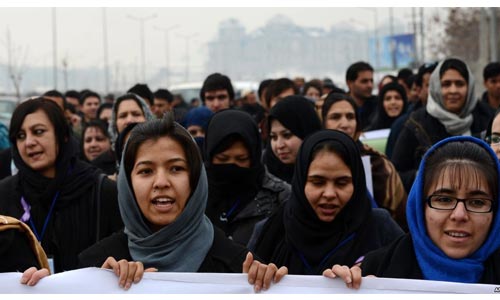Afghan women exercise their rights and freedoms equally to men and hold high political positions in the government’s body following the collapse of the Taliban’s regime. Afghanistan has a handful of female ambassadors, ministers, MPs, senators, etc. They also serve as provincial governors, members of High Peace Council, head of Afghanistan Independent Human Rights Commission (AIHRC), which are top and tough positions with the country’s current sensitive security issue.
With the establishment of democratic government in the post-Taliban regime, both men and women have been entitled equally. That is, gender discrimination has no room in the Constitution as it is stated in Article 22, “Any kind of discrimination and distinction between citizens of Afghanistan shall be forbidden. The citizens of Afghanistan, man and woman, have equal rights and duties before the law.” There is no legal barrier before women to hamper them from social, political or economic activities.
Similarly, a large number of women are serving as civil society activists and women’s rights activists. AIHRC pays especial attention to the rights and freedoms of women and advocates their rights in legal and judicial cases.
Enjoying equal rights and freedoms, Afghan women play an essential role in social, political and economic arenas. They have proved that they are not inferior creature and have the ability to play as important role as men do in the country. They also serve as police and soldiers in Afghanistan despite the life-threatening danger.
Contrary to all the aforementioned issues, there still leaves a lot to be desired. Afghan women encounter a large proportion of challenges, mainly in terms of culture. Traditional culture, which holds strong sway in tribal belts, still looks down on women and deems them inappropriate for social, economic and political activities. That is, discriminatory notion and approach towards women are deeply embedded in Afghanistan’s culture, which will take years to be changed. The public horizon regarding women’s rights and freedoms are highly limited in remote areas and tribal belts. Therefore, violent treatment and honor-killings occur on a massive scale in those areas usually without being reported. To put it succinctly, Afghan women are vulnerable to violence due to strict traditional culture.
Women play a role in security sector, take part in peace negotiations and are involving in rebuilding after war. Based on the calculation of Resolute Support, there are 3,231 women in the Afghan National Police, 1,312 women in the Afghan National Army, and 122 women in the Afghan Special Security Forces, which totally making up roughly 1.4 percent of Afghan security forces.
“Rewarded by NATO for their recruitment and determination, the women are often seen as “the darlings of the West” by both colleagues and their communities,” Wazhma Frogh, a member of HPC and founder of the Kabul-based Women & Peace Studies Organization, is cited as saying by an Istanbul-based journalist Sophia Jones. In the article entitled “The Many Dangers of Being an Afghan Woman in Uniform”, Sophia also quotes a female soldier, who is the only bread-winner of her family of seven, as saying to be viewed as “whores” by community. She also quotes a female army lieutenant that if women seek promotion, they are mostly told to offer sexual favors to their male superiors in return. Over all, women face challenges such as harsh attitudes, discriminatory approaches and unbearable rhetoric, which will dishearten them to play active role in social and political arenas. To not mention being labelled negatively by their colleagues, Afghan female police and soldiers are likely to be viewed negatively in the society and the bulk of Afghan families are not ready to allow their daughters join police or army.
More misogynistic and discriminatory practices are rampant in the Taliban-dominated areas, where women’s rights are violated and their freedoms are curtailed to a great extent. Worst, a number of residents in those areas have been influenced by the Taliban’s warped mindset.
The nascent democracy in Afghanistan provides a relative platform for Afghan women to play their role in social, economic and political issues in the country; however, there are still many challenges ahead. But to view the changes brought up in the post-Taliban’s regime in terms of women’s rights and freedoms, much has been achieved.
Changes in a country which has suffered decades of war will not happen overnight. The past gradual changes, as women hold high political positions and play key role in the country, are promising. Afghan women have to continue their efforts in line with government and women’s rights institutions to overcome the challenges and change the public mindset and cultural values for better.
Home » Opinion » Afghan Women Make Strides with Democratic Constitution
Afghan Women Make Strides with Democratic Constitution
| Hujjatullah Zia

